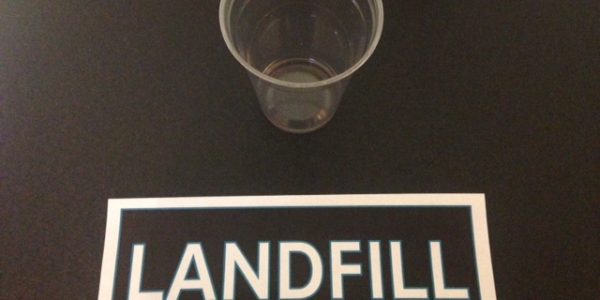Single Use Plastics and their Impacts. Can we change it?

Plastics are a problem
Is the image of a sea turtle with a single use straw up its nose or a beach completely blanketed in plastic trash burned into your brain like it is in mine? No need to stab the fallen. But seriously: plastic (especially the single use variety) is a problem. And sometimes it seems utterly overwhelming a topic to think about let alone to change. After attending the Association of Oregon Recyclers Sustainable Oregon 2019 conference last week, I have been thinking a lot about plastics:
- the rise of the use of plastics after World War 2 as an amazing, cheap, functional new thing
- how plastics have become profusely ubiquitous in every facet of my life (the bathroom, the produce aisle, the doctor’s office, the restaurant)
- about its recyclability AND lack of recyclability
- the question of whether plastic alternatives have more or less environmental impact
According to the Ocean Conservancy beach cleanup, here is the list of the top 10 most common trash items found in the 2018 International Coastal Clean Up report along with the number of those items picked up off the coasts:
Cigarette butts: 2,412,151
Food wrappers: 1,739,743
Plastic drink bottles: 1,5689,135
Plastic bottle caps: 1,091,107
Plastic grocery bags: 757,532
Other plastic bags: 746,211
Straws, stirrers: 643,562
Plastic take-out containers: 632,874
Plastic lids: 624,878
Foam take-out containers: 580,570
Although we aren’t very close to the ocean, we still ship all of our recycling to Portland, much of which gets transported overseas. So we ARE affecting those numbers, too, despite our distance from the sea.
The most profound thing about this list to me is that every item on this list was used one time. And it is all avoidable waste — each thing can be replaced with a reusable thing. (Pipe tobacco, anyone? Ok, I don’t endorse tobacco use, but if that’s your jam, consider a pipe!)
In May, the Center for International Environmental Law came out with a 108 page report entitled Plastic and Climate: The Hidden Costs of a Plastic Planet that addresses the fact that the plastic lifestyle we have embraced on this earth is having a direct and visceral impact on climate change. Here is the summary. If we can’t let go of our dependence on single use plastics (including straws, cups, cutlery, packaging, grocery bags and so much more), we will not be able meet global climate targets such as laid out in Climate Action Steering Committee and the European Union climate action policy.
What are we doing about it locally?
The plastic bag ban passed in the City of Bend in December 2018 with heavy education around bringing your own reusable bags and why that is important. In June 2019, the Oregon State legislature passed a similar ordinance causing talk of repealing the bag ban in Bend so not to cause confusion. This conversation will happen in late July. Regardless, a plastic bag ban is happening across Oregon! Don’t wait until July 1, though, bring those reusable bags now!
For those of us who smoke cigarettes (remember it was the number one most commonly found item on the coasts), you do you. But if you are going to smoke, get those butts off the streets. In downtown Bend, the Broomsmen has set up cigarette butt recycling stations! If you put your butt in there, it will get turned into things like park benches. If you aren’t downtown, please put your butts in the trash. The Broomsmen is also setting up some recycling programs in partnership with some local organizations and a company in Portland called Agylix. They are collecting polystyrene cups from some breweries and hope to expand the business to have monthly collection days for the public.
Organizations like Les Schwab and 4 Peaks are allowing reuse of silipints purchased in the venue for beer or wine vessels. Just remember to keep reusing them later! Bring them on your camping trip, for example.
What can we do?
- Sign up for Plastic Free July!
- Buy less stuff! Think about your purchases. Do you really need it?
- Pay attention to the packaging your purchases come in. Is there a choice with less packaging? Can you buy it in bulk with a BYO Glass Jar or reused bag?
- Have a “togo kit” you keep at hand for outings: reusable bag, reusable silverware, reusable cup for coffee or beer, and even a reusable togo container for when you know you are going out to eat.
- Talk about it. Tell your friends. Tell your neighbors. Teach your kids.
- Know — without a doubt — what is and isn’t recyclable!
Do you know what actually happens to your recycling? Or what happens to the garbage we put in our recycling bin because we think it is recyclable? Recycling is important but knowing what is recyclable is VERY important. The reason that China and other Asian countries stopped accepting recycling is because of contamination issues. That means we have been putting things in our curbside recycling bin that are not recyclable through the outlets where it is being taken. Are you a wishful recycler? We have to do it right! Are you confused about what is and isn’t recyclable? Ask us! You can schedule a presentation for free: ani@envirocenter.org. Or here is a handy sign you can hang by your household or workplace bins to help people learn.
What else do YOU do?